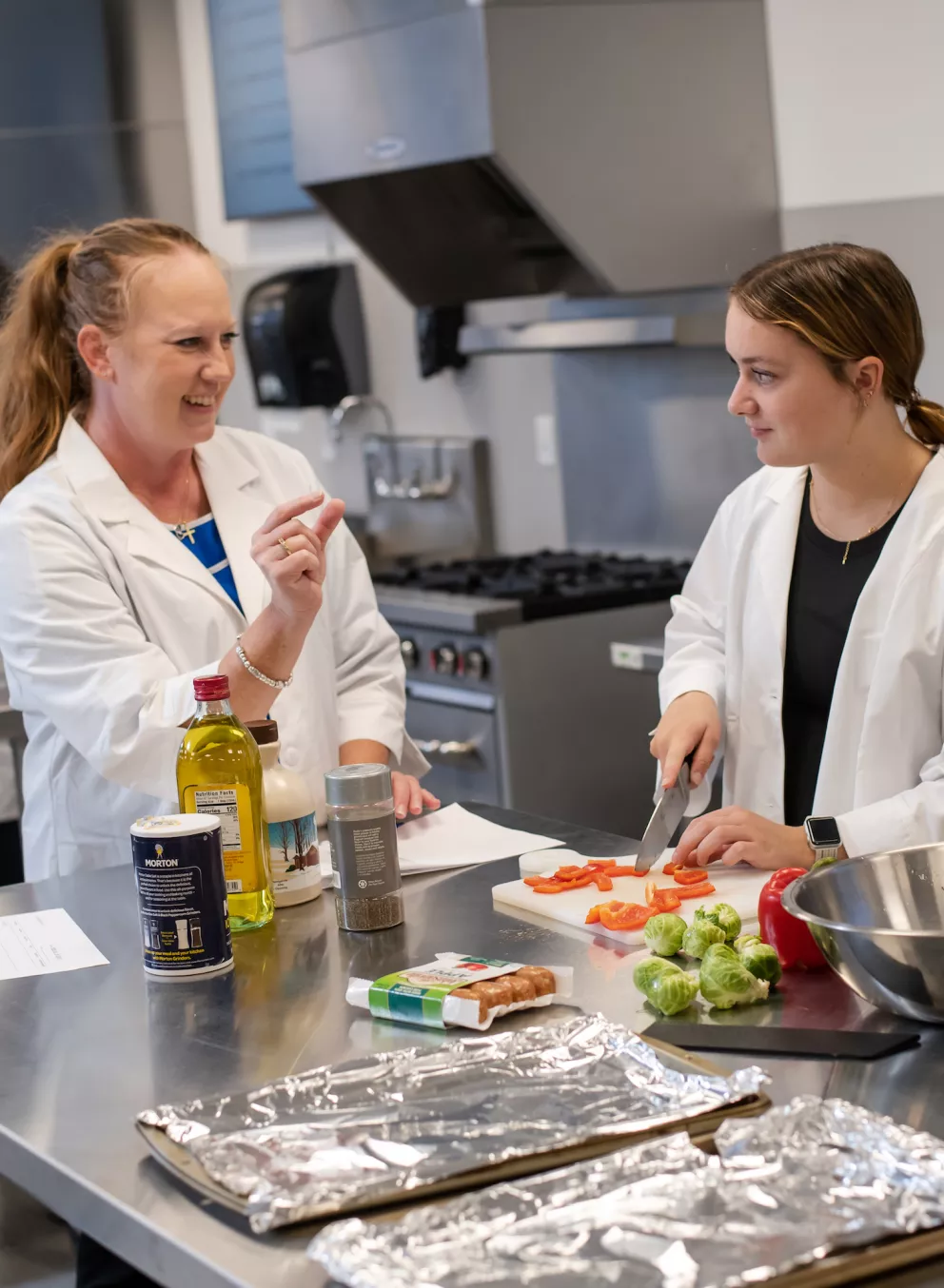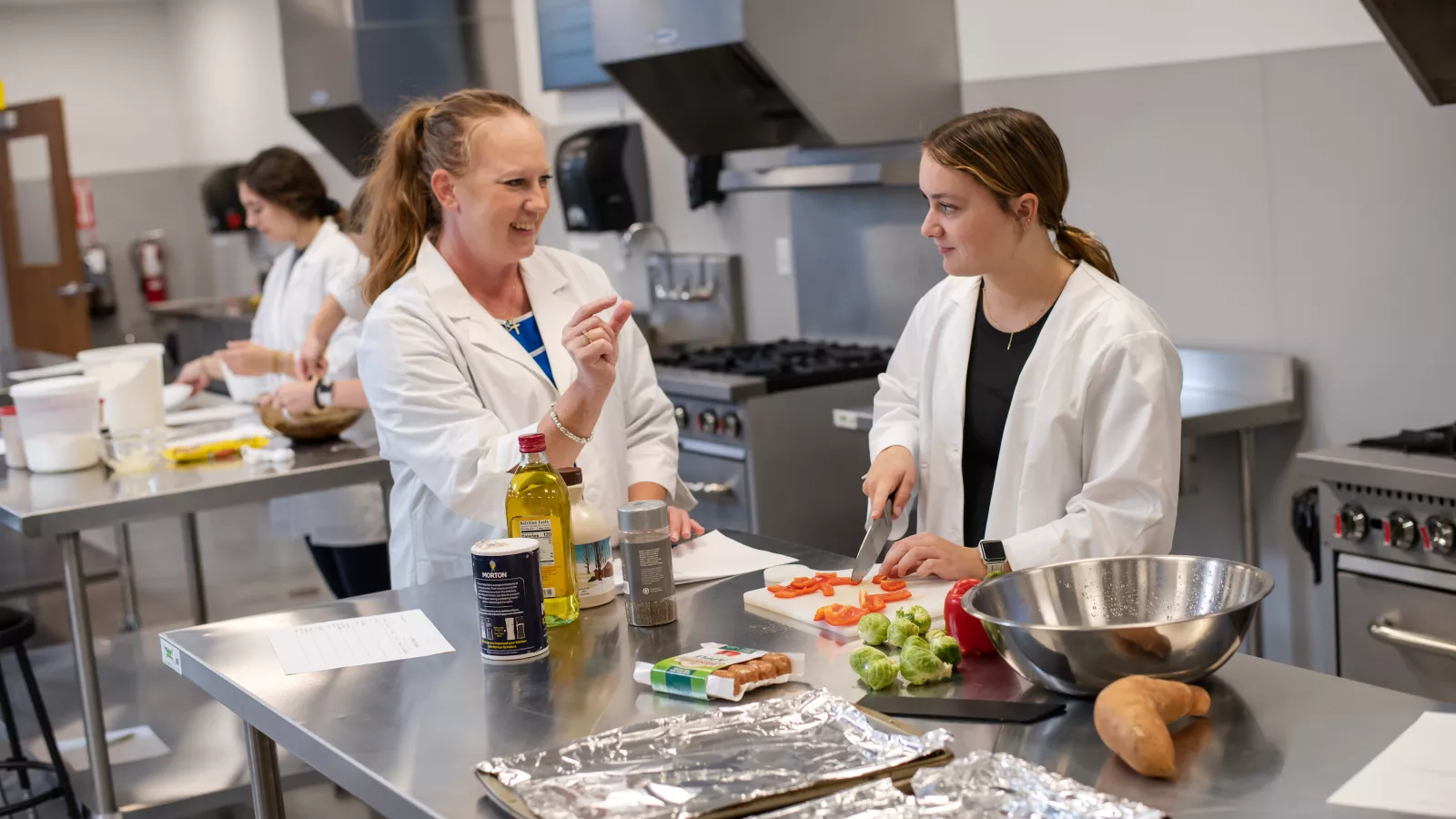Dietetics Program Overview
In today’s world, a staggering number of people can alter their health-related outcomes by making changes to their nutritional intake and you can learn to show them how. If you are passionate about healthy eating and interested in counseling others about nutrition to improve their well-being, our Dietetics program is for you. It will prepare you for a career in the diverse field of nutrition and dietetics.

Learning Experiences
Ashland University’s Dietetics program will provide you with the knowledge to help others truly make a difference in their health. Through hands-on experiences such as leading athletes on dining hall tours, to learning about foods that will improve athletic performance or teaching healthy cooking classes for students and the community, you’ll acquire a strong foundation of physical, biological and social sciences education to understand all dimensions of human nutrition.

Is a Career in Dietetics Right for You?
If you have a passion for nutrition, health and helping others make positive lifestyle changes, if you enjoy science and biology and if you are interested in pursuing a career as a registered dietitian or nutritionist, then a B.S. in Dietetics may be a good fit for you. Additionally, if you are dedicated to lifelong learning, value evidence-based practice, and are committed to promoting health and wellness in individuals and communities, this program could align with your aspirations.

Program Benefits
At AU, small class sizes and passionate faculty mentorship provide a personalized experience. The Ashland University Didactic Program in Nutrition and Dietetics’ mission is to provide the foundational knowledge, skills and experiences necessary to encourage the development of ethical behavior, intellectual growth, critical thought, communication and problem solving skills, in preparation for entry into post-baccalaureate supervised practice leading to eligibility for the Commission on Dietetic Registration (CDR) credentialing exam to become a registered dietitian nutritionist (RDN), professional employment and/or graduate school, as well as developing students to become contributing members of the scientific/professional community. Our graduates have dietetics supervised practice match rates significantly above the national average. Graduates are also prepared for graduate school and professional employment.
- Program Goal 1: The AU DPD will prepare, assist, and encourage program graduates to seek admittance into an ACEND accredited supervised practice program, professional employment or graduate school.
- Objective 1.1: Sixty percent of program graduates apply for admission to a supervised practice program prior to or within 12 months of graduation.
- Objective 1.2: Fifty percent of program graduates are admitted to a supervised practice program within 12 months of graduation.
- Objective 1.3: Fifty percent or more of AU DPD graduates not going into a supervised practice program, employed or seeking employment, will report pursuing an advanced degree.
- Program Goal 2: The AU DPD will prepare graduates to become competent entry-level dietitians through completion of the dietetics program which further leads to completion of a supervised practice program, passing of the RDN exam, and employment in the field of nutrition and dietetics.
- Objective 2.1: The AU DPD one-year pass rate (graduates who pass the registration exam within one year of first attempt) on the CDR credentialing exam for dietitian nutritionists is at least 80%.
- Objective 2.2: At least 80% of AU DPD graduates will receive satisfactory or higher ratings regarding preparation for supervised practice on the supervised practice program director’s satisfaction survey.
- Objective 2.3: Seventy-five percent or more of AU DPD graduates who complete a supervised practice program will be employed in dietetic within 12 months.
- Objective 2.4: At least 80% of AU DPD students complete program/degree requirements within 3 years (150% of the program length).
Program outcomes are available upon request.
Accreditation Council for Education in Nutrition and Dietetics (ACEND)
120 South Riverside Plaza, Suite 2190
Chicago, IL 60606-6995
Phone: 800/877-1600 ext. 5400
Email: ACEND@eatright.org
https://www.eatrightpro.org/acend
Program Requirements
A student majoring in Dietetics, who is also a candidate for a bachelor’s degree, must complete all the course requirements for that particular degree and must earn 123 semester hours of college work with a minimum overall grade point average (GPA) of 2.0. The grade point average in the Dietetics major field must be at least 2.25, although a minimum GPA of 3.0 is recommended.
The completion of an accredited supervised practice program and graduate degree is required before you’re eligible to take the registration examination and obtain the Registered Dietitian Nutritionist (RDN) credential.
Sample Curriculum
For additional information about the Dietetics curriculum, view the Four-Year Curriculum Guide and Academic Catalog.
First Year
Second Year
Third Year
Fourth Year
Registered Dietitian Nutritionists
Registered Dietitian Nutritionists are food and nutrition experts who have met the following criteria to earn the Registered Dietitian credential:
- Completed a bachelor’s degree at a U.S. regionally-accredited university or college and course work accredited by the Accreditation Council for Education in Nutrition and Dietetics (ACEND), such as the Ashland University Dietetics Program.
- Completed an ACEND-accredited supervised practice program at a healthcare facility, community agency or a foodservice corporation, or combined with undergraduate or graduate studies. Typically, a practice program will run six to 12 months in length.
- Passed a national examination administered by the Commission on Dietetic Registration (CDR). For more information regarding the examination, refer to CDR’s website at www.cdrnet.org.
- Completed continuing professional educational requirements to maintain registration.
Some RDNs hold additional certifications in specialized areas of practice. These are awarded through CDR and/or other medical and nutrition organizations and are recognized within the profession, but are not required. Some of the certifications include pediatric or renal nutrition, sports dietetics, nutrition support and diabetes education.
Per ACEND, the Dietetic Internship Match is a computer-based method that provides an orderly and fair way to match the preferences of applicants for dietetic Internships with the preferences of internship program directors. A company called D&D Digital operates the Dietetic Internship Match and helps applicants obtain an Internship (supervised practice position). Information on the Dietetic Internship Match process is on the ACEND website at https://www.eatrightpro.org/acend/students-and-advancing-education/application-process-for-students.
Information about supervised practice programs is updated regularly by the Academy of Nutrition and Dietetics and can be accessed from the Academy website. The information on supervised practice programs is listed under Accredited Education Programs and is available at https://www.eatright.org/. This information is consistent with what is stated in the AU Dietetic Student handbook.
Effective Jan. 1, 2024, the Commission on Dietetic Registration will require a minimum of a master’s degree to be eligible to take the credentialing exam to become a registered dietitian nutritionist. To be approved for registration examination eligibility with a bachelor’s degree, an individual must meet all eligibility requirements and be submitted into CDR’s Registration Eligibility Processing System before midnight Central Time, Dec. 31, 2023. For more information about this requirement, visit CDR’s website: https://www.cdrnet.org/graduatedegree.
In addition, CDR requires that individuals complete coursework and supervised practice in program(s) accredited by ACEND. Graduates who successfully complete the ACEND-accredited program at Ashland University are eligible to apply to an ACEND-accredited supervised practice program.
In most states, graduates also must obtain licensure or certification to practice. Click here for information about state licensure requirements.
Learn more about exams to further your career:
Click here for information about educational pathways to become an RDN.
Internship Opportunities
The Dietetics program at Ashland University is fully accredited by ACEND. This accreditation indicates a highly-regarded program, which means that as a graduate you’ll be eligible to apply for a competitive ACEND-accredited dietetic internship.
The Dietetics program prepares you to become a practitioner in clinical, community, food industry and various government or private organizations and other food service areas of nutrition. Registered Dietitians are employed by hospitals, community agencies and various food service areas of nutrition.
Can You Give Me a Glimpse of My Future?
Whether you're working as a clinical dietitian in a hospital, counseling clients in private practice, developing nutrition programs in community settings or conducting research to advance nutritional science, your expertise in dietetics will empower you to make a positive impact on individuals' lives and contribute to improving public health outcomes.
According to the Bureau of Labor Statistics, dietitians and nutritionists earn an average salary of $69,680 per year. Many earn more as consultants.
Employment of dietitians and nutritionists is projected to grow 7 percent over the next ten years, faster than the average for all occupations.
About 6,100 openings for dietitians and nutritionists are projected each year, on average, over the decade. Many of those openings are expected to result from the need to replace workers who transfer to different occupations or exit the labor force, such as to retire.
Dietitians and nutritionists plan and conduct food service or nutritional programs to help people lead healthy lives. Dietitians and nutritionists work in many settings, including hospitals, nursing homes, clinics, cafeterias and for state and local governments.
To enter the occupation, dietitians and nutritionists typically need a bachelor's or master’s degree. They also typically are required to have supervised training through an internship. Many states require dietitians and nutritionists to be licensed.
Recent Employers of AU Graduates:
- Hospitals
- Long-term care facilities
- Clinics
- Private practice
- Government or private organizations

